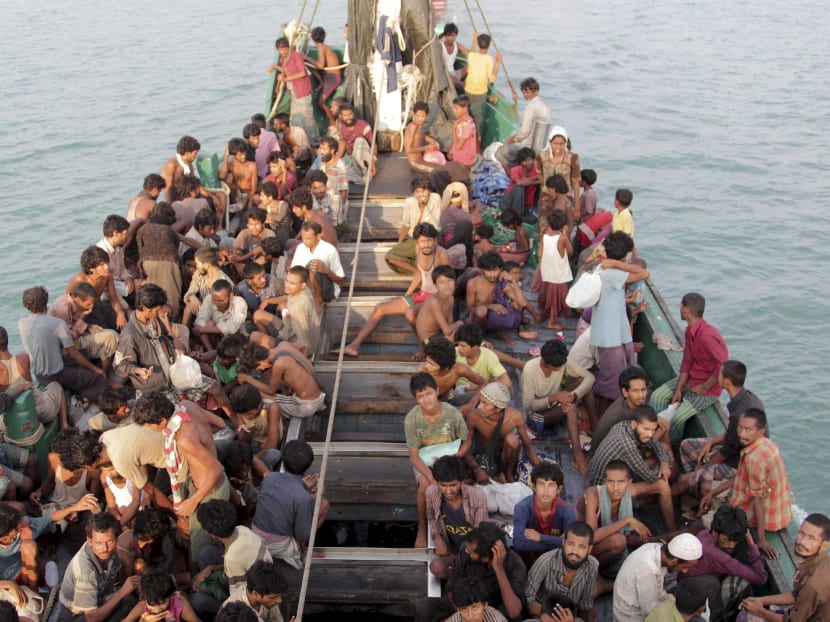As crisis over migrants grows, Malaysia and Myanmar to talk
PUTRAJAYA (Malaysia) — The foreign minister of Malaysia will visit Myanmar today (May 21) to discuss South-east Asia’s migrant crisis, a day after Indonesia and Malaysia offered to temporarily take in thousands of people who have been stranded at sea in a major breakthrough that could ease the emergency.

Rohingya and Bangleshi migrants wait on board a fishing boat before being transported to shore, off the coast of Julok, in Aceh province, May 20, 2015 in this photo taken by Antara Foto via Reuters.
PUTRAJAYA (Malaysia) — The foreign minister of Malaysia will visit Myanmar today (May 21) to discuss South-east Asia’s migrant crisis, a day after Indonesia and Malaysia offered to temporarily take in thousands of people who have been stranded at sea in a major breakthrough that could ease the emergency.
Foreign Minister Anifah Aman will hold talks with his Myanmar counterpart to exchange views on irregular movements of people, in particular human trafficking and people smuggling in South-east Asia, according to the ministry.
In the past three weeks, more than 3,000 people – Rohingya Muslims fleeing persecution in Myanmar and Bangladeshis trying to escape poverty – have landed in overcrowded boats on the shores of South-east Asian countries better known for their white-sand beaches. Aid groups estimate that thousands more are stranded at sea following a crackdown on human traffickers that prompted captains and smugglers to abandon their boats.
The mounting crisis prompted Malaysia to call an emergency meeting with the foreign ministers of Indonesia and Thailand yesterday. Malaysia is the current chair of the 10-nation grouping of South-east Asian countries known as ASEAN.
But while Indonesia and Malaysia said they would temporarily take in some refugees, they also appealed for international help, saying the crisis is a global, not a regional, problem.
Malaysian Prime Minister Najib Razak said he has ordered the navy and the coast guard to conduct search and rescue operations for boats carrying Rohingya migrants stranded at sea.
“We have to prevent loss of life,” Mr Najib said in a tweet.
In Washington, the State Department said the United States was also willing to take in Rohingya refugees as part of international efforts to cope with the crisis. Spokeswoman Marie Harf said that the US is prepared to take a leading role in any multicountry effort, organised by the United Nations refugee agency, to resettle the most vulnerable refugees.
The reversal of Malaysia’s and Indonesia’s positions, after weeks of saying the migrants were not welcome, came as more than 430 weak, hungry people were rescued – not by navies patrolling the waters but by a flotilla of Indonesian fishermen who brought them ashore in the eastern province of Aceh.
“This is not an ASEAN problem,” Ms Anifah said after the meeting. “This is a problem for the international community.”
A joint statement said that Malaysia and Indonesia had “agreed to offer temporary shelter provided that the settlement and repatriation process will be done in one year by the international community”.
Speaking to reporters in Putrajaya, Malaysia, Ms Anifah said the two countries would not wait for international support but would start giving migrants shelter “immediately”.
Indonesian Vice President Jusuf Kalla said his government was ready to shelter Rohingya for one year, while the Bangladeshis would be sent back home. “A year is the maximum,” he said. “But there should be international cooperation.”
Thailand has said it cannot afford to take more migrants because it is already overburdened by tens of thousands of refugees from Myanmar. Its foreign ministry announced it has agreed to provide humanitarian assistance and will not “push back migrants stranded in Thai territorial waters”. It remained unclear, however, how it would deal with such people, or where the Rohingya could permanently settle.
The UN says the Rohingya are one of the most persecuted groups in the world. Neither Bangladesh nor Myanmar recognises them as citizens. In Buddhist-majority Myanmar, even the name Rohingya is taboo. Myanmar officials refer to the group as “Bengalis” and insist they are illegal immigrants from Bangladesh, even though most have lived in the country for generations.
Over the past few years, Myanmar’s Rohingya have faced increasing state-sanctioned discrimination. They have been targeted by violent mobs of Buddhist extremists and confined to camps. At least 120,000 have fled to sea, and an unknown number have died along the way.
The UN refugee agency believes there are 4,000 still at sea, although some activists put the number at 6,000.
In another potential breakthrough, Myanmar Deputy Foreign Minister Thant Kyaw indicated his country would likely join regional talks in Bangkok next week. “We all have to sit down and we all have to consider how to tackle this problem together,” he told reporters in Bangkok after meeting his Thai counterpart.
The No 2 US diplomat, currently visiting South-east Asia, said he will raise the humanitarian crisis of the Rohingya when he meets with senior Myanmar government leaders today.
“The only sustainable solution to the problem is changing the conditions that let them put their lives at risk at the first place,” Deputy Secretary of State Anthony Blinken told reporters in Jakarta.
The migrants brought ashore yesterday in Indonesia were rescued by more than a dozen fishing boats, said Mr Herman Sulaiman from East Aceh district’s Search and Rescue Agency. It was unclear if all the migrants had been on one vessel or had come from several. AP






